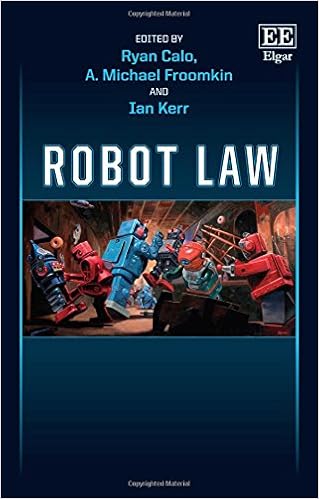 An intriguing new title in the Brooklyn Law School Library collection is Robot Law by Law Professors Ryan Calo, A. Michael Froomkin, and Ian Kerr (K564.C6 R63 2016). The 402 page book brings together research on robotics law and policy written by scholars from law, engineering, computer science and philosophy on topics such as liability, warfare, domestic law enforcement, personhood, and other cutting-edge issues in robotics and artificial intelligence. The book is an in-depth look at an area of law that is growing in importance. Like the Internet before it, robotics is a technology that will transform the social and economic landscape of legal research and practice. Robot Law looks at the increasing sophistication of robots and their widespread use in hospitals, public spaces, and battlefields requiring rethinking philosophical and public policy issues, including how AI interacts with existing legal regimes and changes in policy and in law.
An intriguing new title in the Brooklyn Law School Library collection is Robot Law by Law Professors Ryan Calo, A. Michael Froomkin, and Ian Kerr (K564.C6 R63 2016). The 402 page book brings together research on robotics law and policy written by scholars from law, engineering, computer science and philosophy on topics such as liability, warfare, domestic law enforcement, personhood, and other cutting-edge issues in robotics and artificial intelligence. The book is an in-depth look at an area of law that is growing in importance. Like the Internet before it, robotics is a technology that will transform the social and economic landscape of legal research and practice. Robot Law looks at the increasing sophistication of robots and their widespread use in hospitals, public spaces, and battlefields requiring rethinking philosophical and public policy issues, including how AI interacts with existing legal regimes and changes in policy and in law.
Whether artificial intelligence will one day displace human lawyers has become so important that, this past April, Vanderbilt Law School hosted the first legal conference on the topic, “Watson, Esq.: Will Your Next Lawyer Be a Machine”. Speakers included Richard Susskind, author of “Tomorrow’s Lawyers” and “The Future of the Professions,” and Andrew Arruda, whose firm ROSS Intelligence helped build ROSS (which does not stand for anything), the world’s first artificially intelligent attorney, on top of IBM Watson. Designed by students at the University of Toronto, ROSS is meant for use by lawyers. Asking it a legal question will yeild an “instant answer with citations and suggested readings from a variety of content sources.” ROSS reads and understands language, postulates hypotheses when asked questions, researches, and then generates responses (along with references and citations) to back up its conclusions. It learns from experience, gaining speed and knowledge the more users interact with it.
A recent Washington Post news piece reports that the law firm Baker & Hostetler announced that it is employing ROSS to handle its bankruptcy practice of nearly 50 lawyers. CEO and co-founder Andrew Arruda, says that other firms have also signed licenses with ROSS and expects more announcements soon. Although still in the prototype stage, ROSS shows great promise as an innovative legal research tool. Tasks that ROSS can do include:
- Giving relevant answers – not a list of results – to natural language questions;
- Learning from user’s questions – it learns and improves the more it is used;
- Providing a consistent, easy-to-use experience on any devices used to access it.
At this week’s CALIcon 16 being held at the Georgia State University College of Law, BLS Reference Librarian Harold O’Grady and Technology Educator Lloyd Carew-Reid will present a session, The Future of Artificial Intelligence in Legal Education, Research and Practice. Also participating will be:
- Professor Heidi Brown (Director of Legal Writing at Brooklyn Law School);
- Mikhail Jacob (a Ph.D. student at the Georgia Institute of Technology); and
- Dr. Mark Riedl (an Associate Professor in the Georgia Tech School of Interactive Computing and Director of the Entertainment Intelligence Lab).
